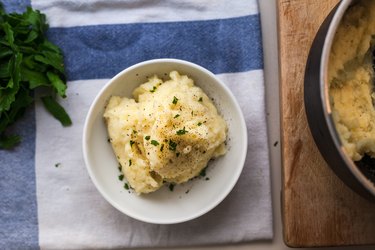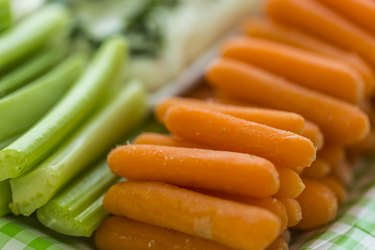
Considering all the restrictions placed on your diet before a colonoscopy, you may want to enjoy an all-you-can-eat buffet as soon as the procedure ends. Realistically, though, your innards may not be ready for such a culinary adventure, which is why doctors suggest a blander post-colonoscopy diet.
Here's what and when to eat after the procedure.
Video of the Day
Video of the Day
What Is a Colonoscopy?
A colonoscopy is a medical procedure where your doctor checks the inside of your large intestine (colon), according to Johns Hopkins Medicine.
The day before a colonoscopy, you follow a clear liquid diet and also take laxatives to clean out the contents of your colon.
During the procedure itself, your doctor will sedate you and then insert a thin tube with a camera on the end of it into your rectum and through your colon to screen for any health problems like abnormal growths, bleeding, ulcers and signs of cancer or gastrointestinal disease, per Johns Hopkins Medicine.
The entire procedure takes about half an hour, according to UCLA Health. After that, you'll spend some time in the recovery room to discuss any findings with your doctor, after which you're free to go home and eat.
Foods to Eat After Your Colonoscopy
For starters, how soon can you eat after a colonoscopy? Right away, according to UConn Health, as long as your stomach feels up to the task.
Nutritionists often advise a "diet as tolerated" when it comes to eating after a colonoscopy, according to Cordialis Msora-Kasago, RDN, a spokesperson for the Academy of Nutrition and Dietetics. That means eating what you can handle at the time — and that may not be much.
For one thing, you may still feel nauseated from the colonoscopy sedation you were given, per UConn Health. For another, you may also feel bloated and gassy from the air that was pumped into your intestines during the procedure, according to Johns Hopkins Medicine.
1. Bland Foods
The foods you eat after a colonoscopy shouldn't be too hard on your system. "We recommend that the first meal [after a colonoscopy] be a light meal, maybe some mashed potatoes, something very simple and easy on your gut," Msora-Kasago says.
Experts advise that you continue eating based on your gut feeling — literally. If eating makes you feel sick to your stomach, simply stop and try again later, according to Columbia University.
"If you are bloated and nauseous and your stomach feels uneasy, it's not the time to go ahead and resume a regular eating pattern," Msora-Kasago says. "Continue on that path until you're ready to take in more. Then you can resume your previous diet."
An August 2020 StatPearls review recommends the following bland foods:
- Low-fat dairy products, such as yogurt, milk and cottage cheese
- Eggs
- Pudding
- Fruit juices
- Cream of wheat
- Tofu
- Lean meat like skinless chicken or fish
- Cooked vegetables like beets, beans, spinach or carrots
- The bland "BRAT" diet of bananas, rice, applesauce and toast
Consider Special Diets
Most colonoscopies are done to screen for colorectal cancer. Some, though, are diagnostic, per the American Gastroenterological Association. That means they're done to try to find a reason for unexplained symptoms like bleeding or weight loss.
If you have a diagnostic colonoscopy and your doctor confirms that you have a particular medical condition, such as Crohn’s disease, you may need to go on what’s called a “therapeutic diet” designed to control or treat that condition, Msora-Kasago says. In this case, your doctor will help you determine what foods are best for you.
2. Hydrating Fluids
The colonoscopy prep solution you took to clean out your intestines before your procedure is dehydrating, according to the Cleveland Clinic. That's why you were asked to drink so much fluid leading up to the test.
As a result, you should also drink lots of liquids afterwards to replace any fluid you lost, per the Cleveland Clinic. Some hydrating options include:
- Water
- Sports drinks
- Non-clear liquids like orange juice with pulp
- Broth
Sample Meal Plan After Colonoscopy
Here's a sample menu to try after your procedure:
- Breakfast: Eggs and toast
- Snack: Applesauce
- Lunch: Cooked vegetables with rice
- Snack: Pudding
- Dinner: Mashed potatoes and lean chicken or fish
Foods to Avoid

After your colonoscopy, it may also be wise to limit fibrous food and instead opt for those blander low-residue (low-fiber) items that take it easy on your intestines, according to Weill Cornell Medicine. Though these high-fiber foods are good for you in the long term, eating them right after a colonoscopy could irritate your gut:
- Raw vegetables
- Vegetables with skin
- Dried legumes like beans or lentils
- Raw fruits
- Fruits with skin
According to UConn Health, it may also be best to avoid other foods that can unsettle an empty gut, including:
- Greasy foods like fast food
- Spicy foods
- Alcohol
Tip
You may lose some weight after a colonoscopy because of the food limitations before the procedure, but you'll likely return to your normal weight soon after you start eating your regular diet again.
Eating for Cancer Risk
Diet has a lot to do with your risk for colorectal cancer, according to November 2012 research in Current Nutrition Reports.
Given that the point of most colonoscopies is to screen for colorectal cancer and find and remove any precancerous polyps, it's wise to stick to a healthy diet once you're feeling ready to eat normally again after your colonoscopy recovery.
Foods to Eat
"We want to make sure you have a diet full of whole grains, fresh fruits, vegetables, nuts and seeds," Msora-Kasago says. "One of the things we're looking for is a lot of roughage and a lot of fiber. Having a diet rich in those foods helps your body clean out things that might eventually cause cancer."
According to the National Institute of Diabetes and Digestive and Kidney Diseases, other high-fiber foods that can lower your risk for developing colon polyps include:
- Fruits
- Vegetables
- Beans
- Bran cereal
Foods to Limit or Avoid
The American Cancer Society (ACS) also recommends avoiding the following foods to lower your risk for colon and rectal cancer:
- Fatty foods like butter, ice cream and cheese
- Red meat
- Processed meat like hot dogs, bacon and sausage
- Alcohol: Limit alcohol to no more than two drinks a day for people assigned male at birth and one for people assigned female at birth, per the ACS.
Best Practices for a Healthy Colon
Besides diet, there are a few other measures you can take to keep your colon functioning at it's best.
According to the Mayo Clinic, these include:
- Exercising regularly
- Maintaining a healthy weight
- Limiting alcohol
- Quitting smoking
- Following the colon cancer guidelines your doctor recommends
- Columbia University Irving Medical Center: “Colonoscopy.”
- National Institute of Diabetes and Digestive and Kidney Diseases: “Eating, Diet, & Nutrition for Colon Polyps”
- American Cancer Society: “Six Ways to Lower Your Risk for Colorectal Cancer”
- American Cancer Society: “Alcohol Use and Cancer”
- UConn Health: "Colonoscopy Frequently Asked Questions"
- Current Nutrition Reports: "Dietary Patterns and the Risk of Colorectal Cancer"
- StatPearls: "Bland Diet"
- Weill Cornell Medicine: "Colonoscopy: How to Prepare Before Your Procedure"
- Cleveland Clinic: "Colonoscopy"
- American Gastroenterological Association: "Coding FAQ - Screening Colonoscopy"
- UCLA Health: "What to Expect on the Day of Your Colonoscopy"
- Mayo Clinic: "5 things you can do to keep your colon healthy"
Is this an emergency? If you are experiencing serious medical symptoms, please see the National Library of Medicine’s list of signs you need emergency medical attention or call 911.